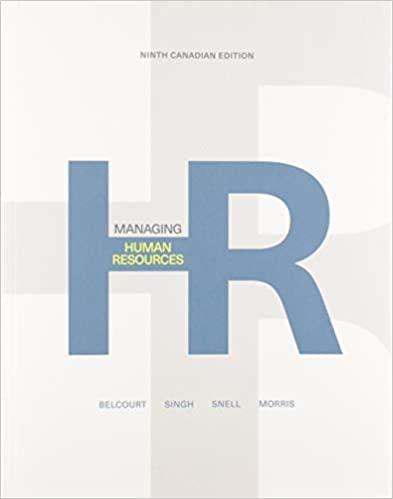There is a long-standing tradition of Canadas federal government to promote free collective bargaining among employee groups.
Question:
There is a long-standing tradition of Canada’s federal government to promote free collective bargaining among employee groups. However, in 1994, the Conservative government in Ontario took steps that effectively excluded Ontario farm workers from collective bargaining rights, rendering previous collective agreements invalid. The International Labour Organization’s (ILO) Freedom of Association Committee ruled that the Ontario government should make changes to recertify the union representing farm workers as well as reinstate their collective agreements. This did not happen, and the federal government did little to intervene.
In 2001, seven years later, UFCW, which was trying to organize the farm workers, won a Supreme Court decision. This led to the Ontario government’s introduction of the Agricultural Employees Protection Act (AEPA) in 2002. But this act, although it allowed farm workers to organize, did not explicitly allow collective bargaining or the right to strike. This also means that not only can a farm worker be fired for striking, but also issues that arise in the workplace cannot be channelled to arbitration for ruling. It appears that these farm workers are able to collectively join a union and bring forth issues, but it is up to employers to act in good faith as they are only required to listen under AEPA. The legislation was challenged in the courts.
In December 2009, the Supreme Court heard arguments from UFCW on the matter. A recent decision by the Supreme Court of Canada handed down the ruling that “the Labour Relations Act, 1995 does not apply to employees or employers in agriculture.” The case was dismissed without costs, and AEPA was found to be in line with the Canadian Charter of Rights and Freedoms. Thus, although the act seems to go against international trade union rights on some level, the courts have ruled that it does not violate Canadian human rights.
Questions
1. Are farm workers entitled to the same rights as other types of unionized workers? Why? Why not?
2. Are collective bargaining rights also human rights? Refer to ILO conventions and the Canadian Charter of Rights and Freedoms in your response.
3. Discuss the pros and cons of farm workers having the right to strike.
Step by Step Answer:

Managing Human Resources
ISBN: 9780176798055
9th Canadian Edition
Authors: Monica Belcourt, Parbudyal Singh, Scott Snell, Shad Morris





